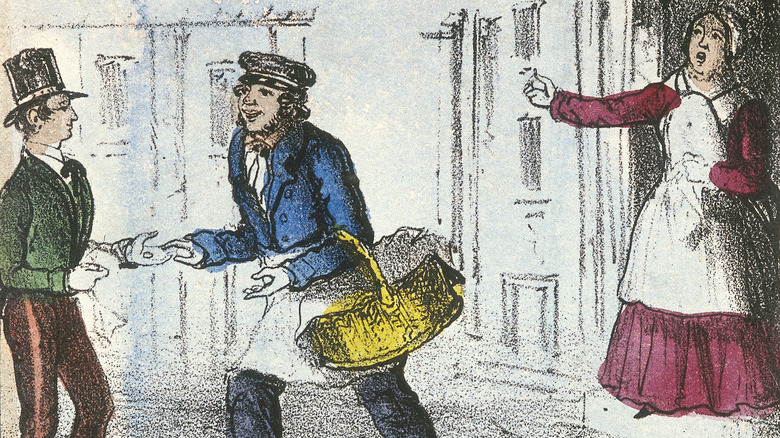Why People Think The Muffin Man Was Actually A Serial Killer
Sooner or later, nearly everyone who grew up with the nursery rhyme "Ring Around the Rosie" learns the twisted theory behind its origin: That it's really a description of the bubonic plague, specifically the Great Plague of 1665. The explanation's popularity greatly exceeds its standing with folklore scholars. "The Oxford Dictionary of Nursery Rhymes" notes that the current lyrics weren't published until 1881, that the "fall" originally corresponded to a gracious movement, and that an old folk belief about children laughing roses applies just as well as the plague theory. Per Snopes, another factor working against the darker explanation is that, despite the rhyme's centuries-long history and variations, the plague theory didn't appear until 1961.
A similar tension between myth and scholarship exists with "The Muffin Man," another beloved nursery rhyme. In their book "The Singing Game," folklorists Peter and Iona Opie trace the written record of "The Muffin Man" back to 1820 and describe it as "the most eccentric of the eccentric ring games." The Museum of London explains its lyrics as a reference to the street sellers who offered cheap muffins and crumpets to poor Victorians. But a theory widespread on the internet posits a much blacker origin: A coded memory of London's first serial killer. According to the history page for the historic pub The White Hart, a baker named Frederic Thomas Linwood, a resident of Drury Lane, would use his wares to lure children into an alleyway and kill them. His victims, the pub claims, numbered 15 children and seven rival bakers between 1589 and 1598.
There's no proof that there was ever a killer Muffin Man
The serial killer interpretation of "The Muffin Man" has plenty of traction. A quick Google search generates scores of results that repeat the claim without question. It's made its way into news outlets like MyLondon, which not only included Frederic Thomas Linwood in its story but mentioned his second moniker: the Drury Lane Dicer. But when Snopes tried to track down the story, they traced it to a TikTok video by Jack Williamson, a self-titled "CEO of History" who didn't provide any sources.
Further research led them to the apparent origin of the Linwood "Muffin Man" story: Uncyclopedia, a parody website. Not only was this spoof of Wikipedia the likely source of the serial killer explanation for "The Muffin Man," it's the only record of Frederic Thomas Lindwood every having existed. According to HuffPost, the oldest confirmed serial killer in English history is Mary Ann Cotton, and she didn't have any connection to muffins. She was also active several hundred years after the Linwood story claims the Muffin Man killer prowled the streets of London.
At most, it could be said that a variant lyric — substituting Dorset Lane for Drury Lane — puts the Muffin Man at the scene of one of Jack the Ripper's killings. But that's hardly the only street name used in place of Drury Lane in the rhyme's history, and there's no evidence that the Dorset Lane variant went with that street because of the notorious serial killer.
The rhyme has been used in sinister movie scenes
Evidence for a sinister, serial killer origin for "The Muffin Man" is slim — so slim, in fact, as to be practically nonexistent. But at least one group of filmmakers independently decided to put a dark spin on the rhyme. One of the more famous scenes in "Shrek" (2001) sees Lord Farquaad (John Lithgow) torturing Gingy the Gingerbread Man (Conrad Vernon). The Muffin Man is the piece of information Gingy is willing to give up to save his gumdrop buttons. When The Muffin Man appeared in "Shrek 2" (2004), he was untouched by Lord Farquaad and bore no resemblance to a serial killer. But he did get a horror movie-type scene in which he creates Mongo, the giant gingerbread man that lets Shrek infiltrate the castle.
The original scene took on a new life as a meme, one that got a lot of traction in 2022 from, of all things, the Depp v. Heard trial in Fairfax County, Virginia. Per Newsweek, Amber Heard's defense attorney fixated on muffins while cross-examining Dr. Shannon Curry, a psychologist called as an expert witness by Johnny Depp's team. Curry had sessions with Heard in the past and mentioned at one of them that the muffins she'd brought into the office had been bought by her husband. The defense seized on that as a sign Curry had given away who her client was, sparking mocking commentary on Twitter and TikTok that traded heavily on the "Shrek" scene.


